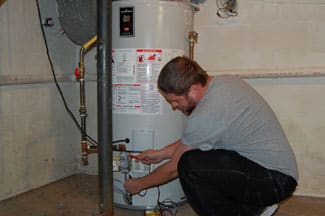The Usual Water Heater Malfunctions
The Usual Water Heater Malfunctions
Blog Article
The article author is making a number of great observations regarding Common Problems with Tank Water Heaters overall in the content down the page.

Visualize starting your day without your routine warm shower. That already establishes a poor tone for the rest of your day.
Every residence requires a trustworthy hot water heater, yet just a few recognize exactly how to handle one. One easy way to maintain your hot water heater in top form is to look for faults on a regular basis and fix them as quickly as they appear.
Bear in mind to turn off your hot water heater prior to smelling around for mistakes. These are the hot water heater faults you are most likely to encounter.
Water too hot or as well chilly
Every hot water heater has a thermostat that determines just how hot the water gets. If the water coming into your residence is also warm despite setting a hassle-free optimum temperature level, your thermostat could be malfunctioning.
On the other hand, as well cold water may be due to a fallen short thermostat, a broken circuit, or improper gas flow. As an example, if you make use of a gas hot water heater with a damaged pilot burner, you would get cold water, even if the thermostat is in perfect condition. For electrical heating units, a blown fuse might be the perpetrator.
Insufficient warm water
Water heaters can be found in many dimensions, depending upon your hot water demands. If you run out of warm water before everybody has had a bathroom, your water heater is as well small for your family size. You should consider mounting a larger hot water heater container or selecting a tankless water heater, which uses up much less space and is extra long lasting.
Unusual sounds
There go to the very least 5 sort of sounds you can speak with a water heater, but one of the most common interpretation is that it's time for the water heater to retire.
Firstly, you should know with the regular appears a hot water heater makes. An electrical heater may seem various from a gas-powered one.
Standing out or banging sounds generally indicate there is a piece of sediment in your containers, and also it's time to clean it out. On the other hand, whistling or hissing noises may merely be your valves letting some stress off.
Water leakages
Leaks could come from pipes, water links, shutoffs, or in the worst-case situation, the container itself. Gradually, water will certainly rust the storage tank, and discover its escape. If this takes place, you need to replace your water heater asap.
Nonetheless, before your adjustment your entire container, make sure that all pipes are in place which each shutoff works completely. If you still need assistance identifying a leakage, call your plumber.
Rust-colored water
Rust-colored water means one of your hot water heater elements is corroded. Maybe the anode pole, or the container itself. Your plumber will certainly be able to identify which it is.
Lukewarm water
Despite how high you established the thermostat, you won't obtain any type of hot water out of a heating system well past its prime. A hot water heater's effectiveness may decrease with time.
You will likewise get lukewarm water if your pipes have a cross link. This implies that when you turn on a tap, warm water from the heater streams in alongside normal, cold water. A cross connection is very easy to spot. If your warm water taps still run after shutting the hot water heater shutoffs, you have a cross connection.
Discoloured Water
Rust is a significant reason for filthy or discoloured water. Corrosion within the water container or a falling short anode rod could create this discolouration. The anode rod protects the tank from rusting on the within and need to be inspected yearly. Without a pole or a properly functioning anode rod, the warm water promptly rusts inside the container. Get in touch with a specialist water heater technician to determine if changing the anode rod will take care of the problem; otherwise, replace your water heater.
Conclusion
Ideally, your water heater can last one decade prior to you require an adjustment. Nonetheless, after the 10-year mark, you may experience any of these mistakes more frequently. At this point, you ought to include a new hot water heater to your spending plan.
How To Troubleshoot 3 Common Water Heater Problems in Twin Cities
The Water Heater Is Leaking
A leaky cold water inlet valve A loose pipe fitting A leaky temperature and pressure relief valve A corroded anode rod A cracked tank Turn Off Your Water Heater:
Shut off your gas water heater by turning the gas valve on the unit to the “OFF” position. Shut off your electric water by switching its power off at your electrical panel. Look for a two-pole breaker labeled “water heater” and turn it to the “OFF” position. Move the ball valve connected to the water heater to be perpendicular to the piping at a 90° angle. Look for the Leak:
Depending on whether the water is coming from the tank's top or bottom, you’ll want to look for the leak in different locations.
If the leak comes from the top of the tank, carefully look for water escaping from the cold water inlet valve or loose pipe fittings. Rusted hot and cold water valves can have loose connections with the tank, with water leaking out of them.
https://mspplumbingheatingair.com/blog/how-to-troubleshoot-3-common-water-heater-problems
As an enthusiastic reader on Water Heaters Problems, I was thinking sharing that blog post was a good thing. Sharing is caring. Helping others is fun. Kudos for your time. Don't hesitate to check up our website back soon.
Top plumbers, one call. Report this page